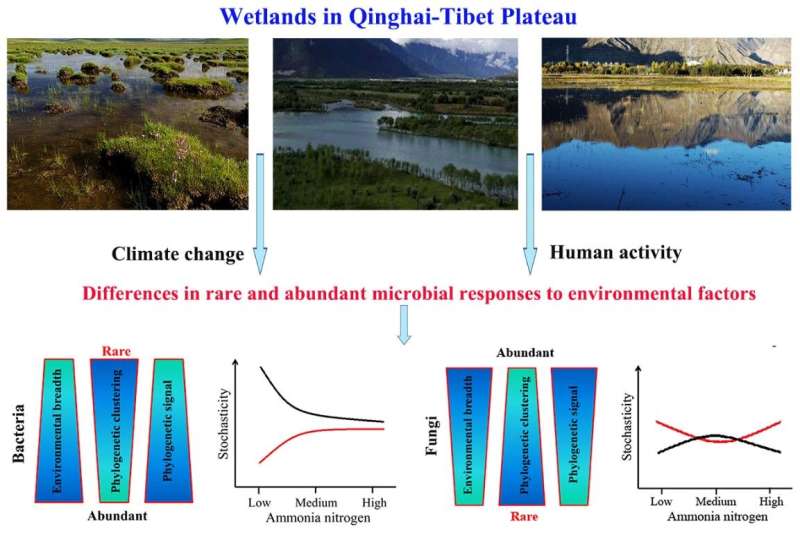Researchers find maintenance mechanism of microbial diversity in Tibet wetlands

Microorganisms participate in biogeochemical cycles of key elements (e.g., carbon, nitrogen, phosphorus, and sulfate), and their diversity is closely correlated with soil ecosystem functions. Disentangling the geographic distribution pattern and microbial diversity maintenance mechanism is of significance to estimate diversity-driven ecosystem functions and potentials. However, study on the maintenance mechanism of microbial diversity in the wetland ecosystems is poorly understood.
Associate professor Wan Wenjie, professor Yang Yuyi and professor Liu Wenzhi from Wuhan Botanical Garden, collaborated with professor Geoffrey Michael Gadd of the Dundee University in UK and professor GU Jidong of the Hong Kong University, took Qinghai-Tibet Plateau as the research object, and determined community composition and diversity of both bacteria and fungi along with environmental gradient.
The researchers employed multiple statistical analysis approaches to calculate environmental breadths, phylogenetic signals, phylogenetic clustering, and ecological community assembly processes.
Abundant bacterial and fungal subcommunities show broader environmental breadths and stronger phylogenetic signals of ecological preference than corresponding rare bacterial and fungal subcommunities. On the contrary, rare microbial subcommunities exhibit closer phylogenetic clustering than abundant microbial subcommunities.
In addition, deterministic processes dominate in the rare bacterial subcommunity, while stochastic processes govern abundant bacterial subcommunity, and rare and abundant fungal subcommunities.
The variation partitioning analysis and neutral model analysis further validates that abundant taxa are less environmentally constrained. Soil ammonia is crucial for shaping the balance between community assembly processes of rare and abundant microorganisms, showing distinct changes in stochasticity with higer ammonia content.
These findings provide new insights and statistical methods for assessing the maintenance mechanism of microbial diversity in wetland ecosystems, and enriches the theoretical basis for the environmental protection of wetland ecosystems in Qinghai-Tibet Plateau.
The research was funded by the National Natural Science Foundation of China, Youth Innovation Promotion Association of Chinese Academy of Sciences, and National Science & Technology Fundamental Resources Investigation Program of China. The findings have been published in the SCI Journal of Molecular Ecology, titled "Environmental adaptation is stronger for abundant rather than rare microorganisms in wetland soils from the Qinghai-Tibet Plateau."
More information: Wenjie Wan et al, Environmental adaptation is stronger for abundant rather than rare microorganisms in wetland soils from the Qinghai‐Tibet Plateau, Molecular Ecology (2021). DOI: 10.1111/mec.15882
Journal information: Molecular Ecology
Provided by Chinese Academy of Sciences





















